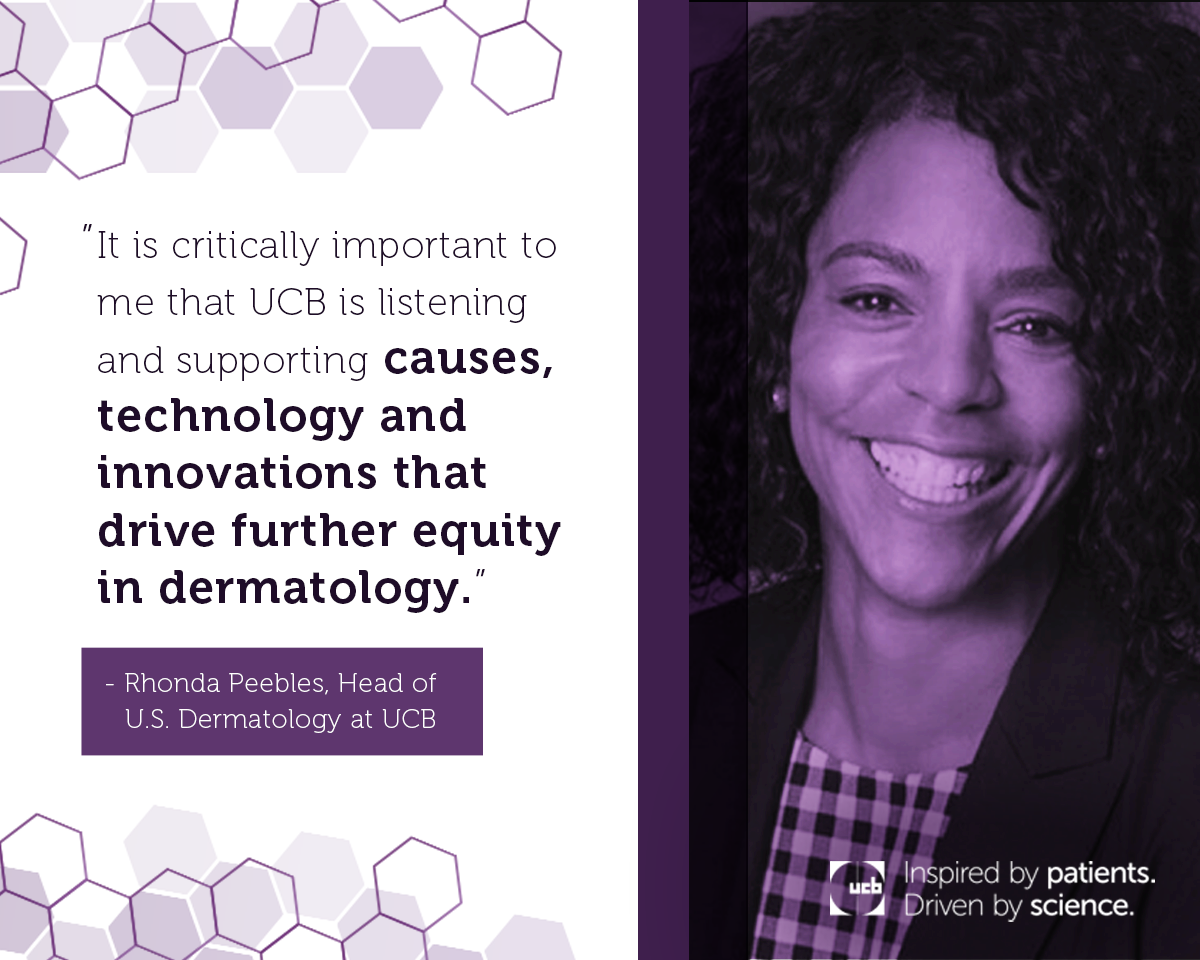
At UCB, we are committed to taking action to bridge gaps and facilitate equitable care for patients of color. Recent media coverage has detailed the various ways disparities manifest in dermatology medical training, clinical practice, pharmaceutical research and development and access to treatment. Gaps in health care provider (HCP) training perpetuate racial disparities in diagnoses – for example, oftentimes psoriasis goes undiagnosed and untreated in patients of color. Many dermatology HCPs don’t treat as many patients with skin of color. Additionally, darker skin isn’t well-represented in medical textbooks, and there is little data on how certain treatments impact patients with skin of color.
As a Black woman, I have family members who want to see a dermatologist who looks like them. Yet, when we look at towns and even major cities across the country, we find few dermatologists with skin of color. I remember years ago when I lived in a city in the Midwest, being on a waiting list for months before I was finally able to see a Black dermatologist. When I think about my own professional experience working in the biopharmaceutical industry and participating in dermatology conferences, I have always been cognizant of how few people look like me in those spaces.
From a research and development perspective, more needs to be done to ensure clinical trials are representative of broader, diverse patient populations. Historically, one of the reasons racial and ethnic minorities have been underrepresented in clinical trials is due to distrust of researchers. Unfortunately, fear among people of color of being “guinea pigs” for research is longstanding and its impact is felt across all medicine. We need to find a way to help people of color overcome these fears and start building trust in the medical field.
Progress also requires, among many things, innovating beyond the traditional clinical trial model. At UCB we are piloting decentralized clinical trials (“DCTs”) as a mechanism to understand how to better integrate clinical trials into the everyday lives of patients. Utilizing telemedicine technology, DCTs allow a network of clinicians and scientists to work with patients directly in the comfort of their homes. Innovations like this represent important breakthroughs for equity, by lessening entry barriers for populations who lack access to transportation to visit doctor’s offices or live in communities with limited access to healthcare.
Solving a problem as systemic as racial disparities in healthcare will require an earnest commitment from all stakeholders. It is critically important to me that UCB is listening and supporting causes, technology and innovations that drive further equity in dermatology. Together, we’ll work tirelessly to move the equity needle forward and pursue solutions that all patients value, no matter their skin type.
Choose Country
- Global Site – English
- Australia – English
- België – Engels
- Belgique – Anglais
- Brasil – Português
- България – Български
- Canada – English
- Canada – Français
- 中国 – 中文
- Česká Republika – Angličtina
- Danmark – Engelsk
- Deutschland – Deutsch
- France – Français
- España – Español
- Ελλάδα – Ελληνικά
- India – English
- Ireland – English
- Italia – Inglese
- 日本 – 日本語
- Казахстан – ағылшын тілі
- 한국 – 한국어
- Luxembourg – Anglais
- Luxemburg – Engels
- Magyarország – Angol
- México & Latinoamérica – Español
- Nederland – Engels
- New Zeeland – English
- Norge – Engelsk
- Österreich – Deutsch
- Polska – Polski
- Portugal – Inglês
- România – Engleză
- Россия – Русский
- Slovensko – Anglický
- Suomi – Englanti
- Sverige – Engelska
- Schweiz – Deutsch
- Suisse – Français
- Türkiye – Türkçe
- Україна – Англійська
- United Kingdom – English
- U.S.A. – English


